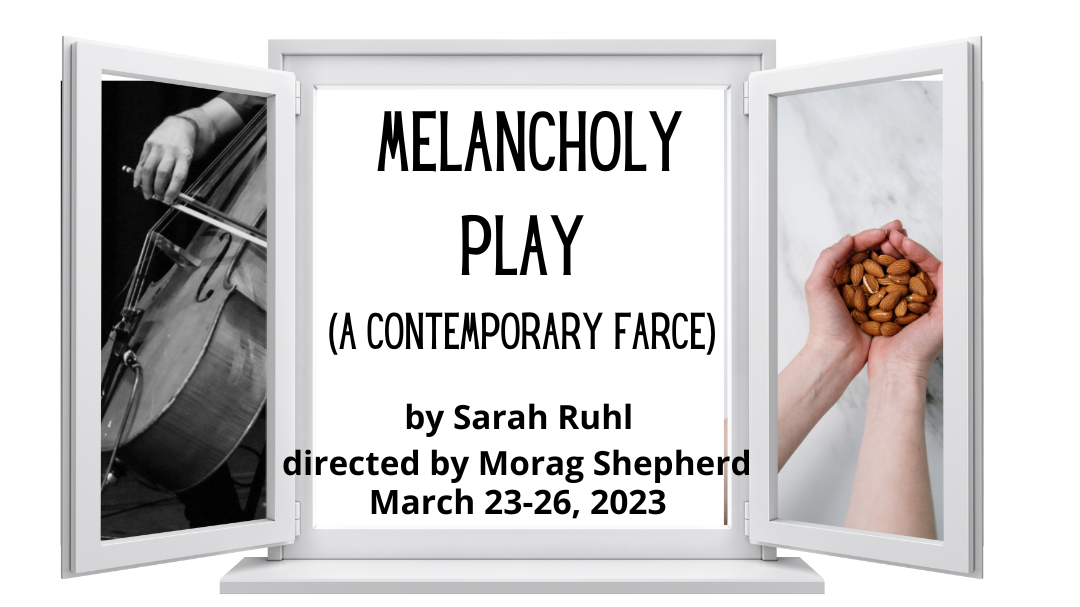TAYLORSVILLE — What do falling in love, unspecified European accents, feeling like an almond, and mournful cello music have in common? In Sarah Ruhl‘s Melancholy Play they are the markers of the absurd realities of living in a world where, sure, we’re all depressed, but are any of us taking the time to truly revel in melancholy? From the outset, the script positions itself as a defense of the much maligned emotion. As the primary testament to the joys of proper melancholia, Ruhl’s main character, Tilly, performed with outlandish melodrama by Ariana Farber, is so melancholy that positively everyone she meets falls immediately and desperately in love with her. One by one, Tilly’s tailor, therapist, hair dresser, and hair dresser’s girlfriend are irresistibly drawn to Tilly’s over the top penchant for rain, crying, and far away gazing. Morag Shepherd‘s directing prowess is on full display as the cast opines, strikes poses, climbs on aerial silks, joins in musical numbers, brawls, addresses the audience, and seduces one another. Plot is nonsensical in the best of ways, and so isn’t really worth trying to explain further.
 What is worth discussion is the excellent cast. All five are impressive, and they create a delightful ensemble. I really couldn’t take my eyes off of Sam Torres as Frances, Tilly’s hairdresser. Her expressiveness and physicality pair perfectly, and her use of aerial silks in the second half was impressive and beautiful. Amona Faatau as Frank, who is both Tilly’s primary love interest and the narrator of sorts, has a youthful charm and vulnerability that kept me grinning as he longed for Tilly’s tears. Barrett Ogden and Ashley Wilkinson round out the cast, both making great use of accents. Ogden kept me laughing from start to finish with his dry pathos, and is also credited with choreography for a ridiculous and delightful fight scene. Last but not least, Alexandra Call is a vital part of the ensemble, providing an incredible live cello soundtrack for the performance. This cast works together to explore the beauty of sorrow and longing while riding the wave of a challenging poetic script rooted in absurdism. For example, actors lines frequently entwine or are recited together. The script’s flow is riddled with non-sequiturs and abrupt changes in mood, none of which comes from any identifiable motive. It is easy for a script like this to become a burden on the audience, but this production carries it lightly, even joyfully.
What is worth discussion is the excellent cast. All five are impressive, and they create a delightful ensemble. I really couldn’t take my eyes off of Sam Torres as Frances, Tilly’s hairdresser. Her expressiveness and physicality pair perfectly, and her use of aerial silks in the second half was impressive and beautiful. Amona Faatau as Frank, who is both Tilly’s primary love interest and the narrator of sorts, has a youthful charm and vulnerability that kept me grinning as he longed for Tilly’s tears. Barrett Ogden and Ashley Wilkinson round out the cast, both making great use of accents. Ogden kept me laughing from start to finish with his dry pathos, and is also credited with choreography for a ridiculous and delightful fight scene. Last but not least, Alexandra Call is a vital part of the ensemble, providing an incredible live cello soundtrack for the performance. This cast works together to explore the beauty of sorrow and longing while riding the wave of a challenging poetic script rooted in absurdism. For example, actors lines frequently entwine or are recited together. The script’s flow is riddled with non-sequiturs and abrupt changes in mood, none of which comes from any identifiable motive. It is easy for a script like this to become a burden on the audience, but this production carries it lightly, even joyfully.
The technical elements of the show are not quite as outstanding as the performances. Jonah Kirkhart‘s simple set is lovely and functional, but doesn’t seem to have a cohesive design. The same can be said for the costumes. Both are adequate, but fall short of living up to the high standard deserved by the performers. Most distracting is the lighting design which is too simplistic, bouncing between two area lights. The high drama of the script and stellar performances could really be enhanced by some spotlight effects or bolder design choices. Currently the actors are occasionally left in semi darkness, or gamely try to position themselves within the light, but the lack of side and front light, in combination with the lovely use of hanging picture frames, means that there are many moments where it is difficult to focus on their faces as shadows attempt to swallow them up. It could be, as I saw a final dress rehearsal, that this issue will be resolved, but on the whole, it does not impact the wild, wacky thrills of the performance.
A note about the content warning: The website recommends the play for ages 18+. This warning seems unwarranted to me. While the onstage flirtation factor among the cast is 100% steamy and is unapologetically LGBT friendly, all on stage intimacy is conducted fully clothed and includes little more than some hip action and a chaste kiss. I think many mature young people would really enjoy the show especially if seen with a trusted adult with whom they can talk about it.
Wasatch Theatre Company is celebrating their 25th season and continues to be one of my favorite companies for presenting rarely seen, high quality, contemporary works. Melancholy Play carries on that tradition of excellence.
[box]Wasatch Theatre Company’s production of The Melancholy Play plays at the Mid Valley Performing Arts Center, Studio 5400 at 2525 Taylorsville Blvd. Taylorsville, Utah on March 23-26, 2023 at 7:30 PM, with matinees March 25 & 26 at 2:00 PM. Tickets are $20, or $15 with student ID. For more information , visit wasatchtheatre.org[/box]
